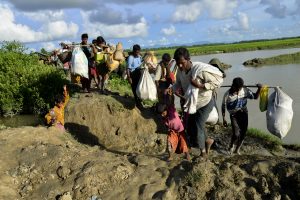Across Southeast Asia, thousands of Rohingya refugees are fleeing the genocide in Myanmar only to find themselves caught up in another wave of persecution. In countries like Thailand, Malaysia, and India, they are treated as illegal migrants and imprisoned in overcrowded jails with little legal recourse. Others are preyed upon by traffickers posing as legal aides.
Back home in Myanmar, the civil war rages. The junta continues to burn down homes and shoot civilians. Tens of thousands of families are being displaced. People are dying of hunger; children go without medical care And young people are being forcibly recruited to help the junta hold on to the power it seized in the 2021 coup.
Our plight epitomizes the international community’s failure to uphold basic human rights. It has been seven years since the junta unleashed mass atrocities that forced more than 700,000 Rohingya to flee their homes, including my family. That number keeps growing. Today, more than 1 million Rohingya languish in squalid refugee camps in Cox’s Bazar, Bangladesh. Hundreds more remain imprisoned around the world. All their futures are uncertain.
The international community must do more to help us. The United Nations High Commissioner for Refugees (UNHCR) and other humanitarian organizations must exert pressure on host countries to ensure the safety and well-being of Rohingya refugees and prisoners alike. We need more financial assistance so that refugees can rebuild their lives and hopefully return home one day. We need better security in refugee camps so families, who have already lost so much, can live peacefully. Countries imprisoning Rohingya must recognize their status as refugees under international law and grant them the right to work and move freely within their borders. And, lastly, there must be regular monitoring and intervention to not only prevent further abuses but to provide avenues for resettlement to third countries willing to offer sanctuary.
It is heartrending to consider that my people have faced decades of targeted violence, systemic discrimination, and waves of displacement. I was only 14 years old when my family fled the escalation of violence in August 2017. I had to take a lot of responsibility for making sure my family had enough food and other supplies that we needed while at the camp. I saw firsthand all the challenges that Rohingya people face in these camps. Families have zero income and the monthly rations they receive are not enough to survive on. People are struggling to get a basic education, to learn to read or write. If this continues, I fear that one day we may lose our culture and identity. And I have seen traffickers target and coerce teenagers into illegal activities. These experiences fueled my commitment to help Rohingya refugees get a better life.
While in the camp, I learned English with the help of tutors and by watching YouTube videos. Then, I started to advocate for my community. I worked with international humanitarian organizations to help refugees get food and other resources, and to help women and girls learn to read and write.
I later won a scholarship to a university in Bangladesh. When I wasn’t on campus, I was back in Cox’s Bazar caring for my family and advocating for the other refugees by translating their needs to NGOs on the ground.
In December 2022, my family was lucky enough to be among the first Rohingya chosen for resettlement in the United States Although I am thousands of miles away from home, I continue to advocate for my people. More than 1 million men, women, and children are being denied the most fundamental rights to freedom, safety, and security. While I was elated when the U.S. officially declared the atrocities committed by the junta as a genocide in March 2022, little has been done since then to meaningfully help the Rohingya.
Last week, I was pleased to see the bipartisan introduction of the Rohingya Genocide Accountability and Protection (GAP) Act in the U.S. House of Representatives. The U.S. Congress should pass this legislation in order to start moving beyond the mere recognition of the genocide to taking decisive action to address it and support the Rohingya people.
Ending the atrocities committed against the Rohingya people is not merely a matter of compassion but of adherence to the principles of human rights that all nations should uphold. The world must not ignore our ongoing suffering. Our plight demands urgent, coordinated action to end the cycle of persecution and ensure that every individual, regardless of their ethnicity or religion, can live in dignity and safety.
Rohingyas are not asking for special treatment – they are asking for the most basic human rights that have been denied to them for far too long. While we are very much grateful to all the hosting countries in Southeast Asia, including Bangladesh, for allowing Rohingya to seek refuge within their borders, we ask the international community to be more responsive and supportive to the refugees, Rohingya prisoners locked away in foreign jails, and those still suffering in Myanmar. It is time for the world to listen – and to act until everyone is safe and there is a sustainable solution for all.

































